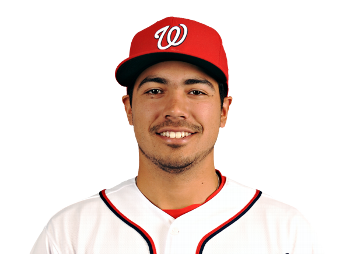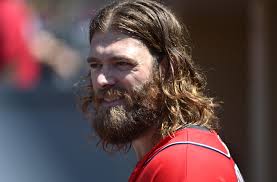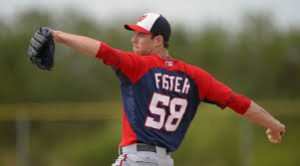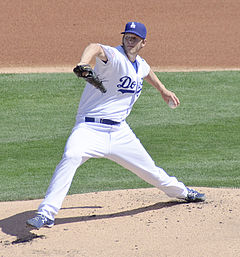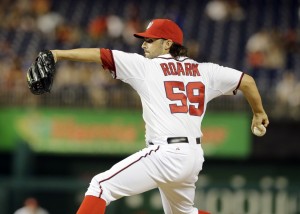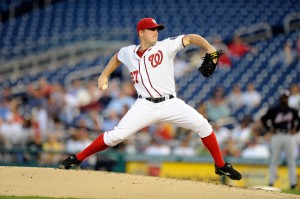
Zimmermann’s status is on everyone’s mind. Photo Unk.
I used to love answering the questions that MLB.com beat writer Bill Ladson would post. But Ladson hasn’t done such a column in months, and the other outlet for such a post (Tom Boswell) usually is populated with too many non-baseball questions to be worth addressing. So today WP beat reporter James Wagner took a crack at a Q&A session and I thought it’d be fun to do a version of his Q& (my) A.
As with previous posts, I write my response before reading his and edit the questions for clarity/conciseness.
Q: What was the Nats’ final record against winning teams & how did it compare to the other playoff teams?
A: Wagner summarized the answer well; the Nats ended up 23-23 against winning teams. To show you how useless this stat is in predicting the playoffs, the team with the best record (the Orioles) was swept and the WS matchup features the Giants, who had a losing record against winning teams. Once again we learn that the post-season is about getting hot (or in the Nat’s case, disappearing) at the right time. Wagner did the same analysis.
Q: Will the Nats turn to Tyler Clippard as the 2015 closer?
A: Doubtful. Despite Drew Storen‘s second playoff meltdown, he’s likely the closer in 2015 on the strength of his excellent 2014 season. Tyler Clippard‘s of more use in generally higher-leverage 8th inning situations, and likely continues in that role. This has to be a bummer for Clippard, who enters his last arbitration argument without the benefit of the lucrative saves, but who is also just as likely to cash in when he hits free agency with a team looking for a reasonably priced closer. I’ll bet he can get a 3yr/$24M deal as someone’s closer. He is a fly-ball guy (not optimal as a 9th inning solution) but fly-ball pitchers definitely play well in pitcher parks. He’d make an excellent closer for most any team on the west coast. Wagner agrees.
Q: Why not keep both LaRoche and Zimmerman and platoon them at first base?
A: Because that’s an awful lot of payroll to dedicate to a platoon. LaRoche likely gets $15M/year, Zimmerman is set to earn $14M next year. Both are middle-of-the-order bats who need to play every day. Unfortunately we don’t have a DH, else you’d re-sign LaRoche immediately and they’d split time at 1B/DH like most every other DH in the AL. LaRoche is getting one last crack at free agency and could get another 2 year deal (rumors have him as a great fit in Milwaukee). I think sticking Zimmerman at 1B makes the most sense considering the description of his shoulder at this point (he used the phrase “bone on bone” to describe the state of his arm at this point). In fact, I think Zimmerman makes a great first baseman, immediately becomes a Gold Glove candidate, and (hopefully) stays healthy. Wagner makes the same points.
Q: How about Steven Souza as our 2B solution?
A: Souza started his pro career as a third baseman … and was moved to the outfield by the time he was 22. I’m guessing there’s a reason for that. I don’t see him coming back to the infield, either at 3b or 2B. He’s way too big to play second base effectively (he’s 6’4″ 225); if I was forced to play him in the infield, i’d suffer with him at 3B and stick Rendon back at second. But that’d be a waste of Rendon’s defensive talents at the hot corner; we’re much better off installing him at his natural position and finding another 2B alternative. None of this really talks about what the team *should* do with Souza; he’s more or less blocked for 2015 (as we’ve discussed to death) but has nothing left to prove in AAA. His best case scenario is an injury in the Nats 2015 outfield, which gives him playing time. Wagner points out Souza’s poor defensive record in his time at third.
Q: Should we care about the MASN outcome?
A: Uh, yes. The Nats could easily expand payroll with a decision and a guaranteed income stream, and we’d not be hearing about how they “have to” let some of their core players walk because they can’t afford them. The MASN issue has gone on way too long, and it seems like it is getting ready to affect both the Nats and the Oriole’s business operations soon. Wagner agrees.
Q: Do players and broadcasters read blogs and the press?
A: I hope not. We’re not professionals; we don’t have day in-day out access, intimate knowledge of the team’s comings and goings, nor insight into reasons that may be behind a player’s cold streak (does he have the flu? Is he nursing a slight sprain that nobody knows about?) I don’t think any good comes of professional players reading about themselves. If a player called out something I wrote derogatory i’d probably profusely apologize and retract it. Wagner says players sometimes read about themselves in the press … but that if they don’t, they’re likely to hear about it from family/friends/agents anyway.
Q: Which of the bench players (Frandsen, Hairston, Schierholz, McLouth) will be back and who will most likely leave?
A: Well, McLouth is still under contract for 2015, so he’ll at least start the year with the team (whether he finishes depends on whether he can regain some value). I’d guess that the other three are gone. None of the three hit particularly well for us, and all three are replaceable by internal promising candidates. Frandsen probably has the best chance of sticking around since he’ll be so cheap (he made $900k last year and is arb-eligible); he’ll be an interesting tender-deadline candidate.
Your 5-man bench needs a catcher (Lobaton), a guy who can play both 2b and SS (Espinosa, if he’s not the 2B starter), an outfielder who can cover center (McLouth), a utility guy who can play multiple positions (Frandsen fits here), and then a big bopper who can pinch hit. This last spot has been held by the likes of Tyler Moore, Chad Tracy, Matt Stairs, Jonny Gomes in the past few years. In 2015 it makes more sense to have Souza in this spot. Only problem is that it helps if this last bench spot is a lefty. We’ll see how the transactions play out this off-season.
Q: If you must chose between Zimmermann and Desmond, whom do you chose?
A: Desmond. Harder position to fill, less in the minor league pipeline, probably cheaper too thanks to Desmond’s sub-par (for him) 2014 season. Zimmermann seems likely to earn nearly $20M/year at this point, which is going to be too rich for this team, and there’s ready-made replacements in the upper minors (A.J. Cole, Blake Treinen, Taylor Jordan) ready to step in immediately after he departs. A better question might be this: do the Nats flip Zimmermann this off-season for something better than a compensation pick, admitting to themselves they won’t be able to extend him? It makes 2015 team weaker obviously, but also could ease the transition to the next “phase” of this team that starts in 2016-2017. Wagner agrees, but also mentions that Doug Fister plays into this decision too.
Q: If the Nats make it back to the postseason next year, can you envision them carrying a speed first guy like Rafael Batista or Wilmer Difo on their roster a la the Kansas City Royals?
A: No. Williams is old-school and made it pretty clear that he was managing his post-season team the same way he managed his regular-season team. For better or worse. The makeup of this team isn’t the same as the Royals, who have focused on speed, defense and bullpen strength to power their way through the post-season. The Nats are a starter-first, adequate but fragile offense second. Wagner isn’t as dismissive as I am.
Q: Why not find a FA third baseman and move Rendon to second?
A: A completely logical idea that we’ve talked to death. Definitely on the table. Wagner puts out some names that likely are going to be too expensive for the Nats to really consider.
Q: If the Nats offered Zimmermann a big extension and he declined it, could you see the Nats trading him?
A: If I were the GM, I’d consider it yeah. You take a step back in 2015 to set yourself up for 2016 and 2017 with the right deal. Maybe you flip Zimmermann for the 2b/3b player you need and a prospect or two further away, save some payroll and provide more continuity. My reading the tea leaves though? I don’t see this team doing it; they’ll “keep the band together” for one more run with this crew in 2015, and then make adjustments for 2016 depending on who they can sign and who walks. Wagner thinks its possible, but also cautions that the 2015 salary ($16.5M) and just one year of control will limit what the Nats get back. A very fair point.
